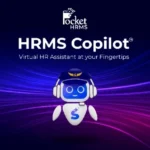
Role of Meta AI in HR Management
Table of Contents

Reading Time: 4 minutes
What is Meta AI?
Meta AI is the future of artificial intelligence that dedicated to advancing the state of AI and applying it to improve Meta’s products and services.
Meta AI focuses on pushing the boundaries of what AI can do by exploring new techniques and methodologies in machine learning, natural language processing, computer vision, robotics, and other areas of AI.
It can be integrated with several other platforms such as Facebook, Instagram, WhatsApp, and Oculus, to improve user experience, enhance content moderation, and develop new features.
What is Meta AI in HR?
Meta AI in the context of Human Resources (HR) refers to the application of advanced artificial intelligence technologies developed by Meta Platforms Inc. to optimize and enhance HR functions and processes.
The HR functions such as:
- Hiring
- Onboarding
- Offboarding
- Payroll processing
- Employee Engagement Planning
- Workforce Strategizing etc
The application of Meta AI simplifies and streamlines the processes of HR hence enhancing a better fit and productivity for the future of the company.
Importance and potential of AI in HR management
The importance of Meta AI in human resources management is remarkable and holds greater significance in streamlining HR processes such as:
1. Efficiency and Automation
The foremost importance of AI in HR is it automates the HR tasks hence making it simplified and fast to be accomplished in real-time with the help of HR chatbot etc.
AI can handle repetitive administrative tasks such as resume screening, scheduling interviews, and processing payroll.
2. Enhanced Decision-making
AI can analyze large volumes of HR data to provide actionable insights, helping HR managers make informed decisions regarding hiring, promotions, employee engagement, and employee development.
AI can predict trends such as employee turnover, enabling proactive measures to improve retention and workforce planning.
3. Elevates Risk Mitigation
Predictive models can identify patterns that may indicate potential risks, such as workplace safety concerns or compliance breaches, allowing for timely interventions.
AI can help reduce unconscious bias in hiring and promotions by providing objective assessments based on data rather than subjective judgment.
4. Learning and Development
AI-driven learning platforms can adapt to each employee’s learning style and progress, providing customized training programs that enhance skill development.
AI can map employees’ skills against future job requirements, helping HR plan for upskilling and reskilling initiatives.
5. Performance Management
AI helps in performance management by automating the evaluation process of accessing the performance metrics and KRAs of employees.
It provides a detailed insight into employees’ performances, assisting HR managers in mapping the appraisal of the employee as per the tasks and goals accomplished.
Benefits of Using Meta AI in HR Management
The benefits of Meta AI in HR management include the following:
➔ Improved Employee Experience
AI improves the employee experience by streamlining the HR processes and getting quick responses of their queries.
Additionally, AI can create tailored onboarding experiences based on the new hire’s role, background, and preferences, leading to faster and more effective integration.
➔ Data-Driven Decision-Making
It provides credible data regarding employee’s performances, metrics and parameters which helps the HR managers to make data driven decision.
Furthermore, it diminishes biases and favoritism in decision-making as the decisions are based solely on the analytics of the employees’ employment history.
➔ Personalized Learning and Development
AI recommends training programs and courses tailored to individual employees’ career goals and learning needs.
The analytics provides a fair scope for employees career growth, in accordance to which training and learning sessions and workshops can be arranged for the employees hence reducing costs and increasing productivity.
➔ Enhance Talent Acquisition
AI can quickly scan and filter resumes to identify the best candidates, saving time and reducing human bias.
AI algorithms match candidates to job roles based on their skills, experience, and other attributes, improving the quality of hires.
➔ Improved Compliance Management
AI ensures adherence to labor laws and company policies by monitoring and flagging potential issues. Predictive models identify potential risks related to employee behavior, workplace safety, and other factors, allowing for timely interventions.
Key Areas of HR Management Enhanced by Meta AI
Meta AI enhances several key areas of HR management, leveraging artificial intelligence to optimize and improve various HR functions. Here are the key areas of HR management that are significantly enhanced by Meta AI:
- Hiring
- Onboarding
- Employee Engagement
- Evaluation of Performance Metrics
- Compliance management
- Risk Management
- Diversity and Inclusion, etc.
Implementation Strategies
Implementing Meta AI in HR includes the following steps:
1. Assessment and Strategizing
Strategize the implementation techniques such as the team to be associated with, resources to be utilized, costing, etc. Understand the pain points and inefficiencies that AI can address and involve key stakeholders, including HR professionals, IT teams, and senior management, to ensure buy-in and support for the AI implementation.
2. Technology Selection
Select the technology and the supplier of the technology wisely by scrutinizing the features that align with your company policies, budget, and implementation techniques.
3. Data Management
Ensure that the data used by AI systems is accurate, complete, and up-to-date. High-quality data is essential for effective AI performance.
4. Integration with Existing Tools
Ensure that AI solutions integrate seamlessly with existing HR systems and workflows. This reduces disruption and maximizes the benefits of AI.
5. Monitoring
Constantly monitor the implementation of the technology and ensure that it align with your company’s parameters, metrics, and efficiency.
6. Compliance Check
Ensure that AI implementation complies with relevant regulations and standards related to data privacy, employment law, and ethical AI use.
7. Feedback
Encourage employees to provide feedback on AI tools and their impact on HR processes. Use this feedback to make necessary adjustments and improvements.
Conclusion
Meta AI in HR management holds tremendous importance and potential for transforming how organizations manage their human capital. By automating routine tasks, providing deep insights through data analytics, and enhancing personalization, AI enables HR professionals to focus on strategic initiatives that drive organizational success. Additionally, the potential to reduce bias, improve compliance, and enhance employee experience makes AI an invaluable tool for modern HR management. As AI technology continues to evolve, its role in HR is likely to expand, bringing even more innovative solutions to the forefront.







